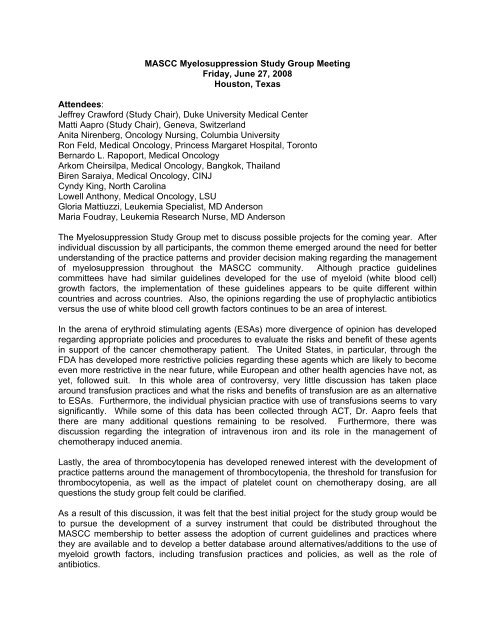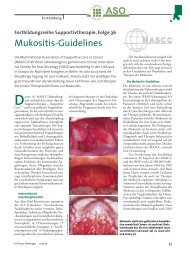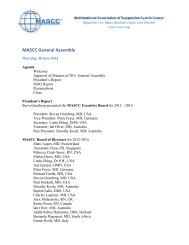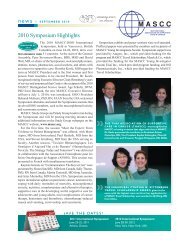2008 Minutes (PDF)
2008 Minutes (PDF)
2008 Minutes (PDF)
You also want an ePaper? Increase the reach of your titles
YUMPU automatically turns print PDFs into web optimized ePapers that Google loves.
MASCC Myelosuppression Study Group Meeting<br />
Friday, June 27, <strong>2008</strong><br />
Houston, Texas<br />
Attendees:<br />
Jeffrey Crawford (Study Chair), Duke University Medical Center<br />
Matti Aapro (Study Chair), Geneva, Switzerland<br />
Anita Nirenberg, Oncology Nursing, Columbia University<br />
Ron Feld, Medical Oncology, Princess Margaret Hospital, Toronto<br />
Bernardo L. Rapoport, Medical Oncology<br />
Arkom Cheirsilpa, Medical Oncology, Bangkok, Thailand<br />
Biren Saraiya, Medical Oncology, CINJ<br />
Cyndy King, North Carolina<br />
Lowell Anthony, Medical Oncology, LSU<br />
Gloria Mattiuzzi, Leukemia Specialist, MD Anderson<br />
Maria Foudray, Leukemia Research Nurse, MD Anderson<br />
The Myelosuppression Study Group met to discuss possible projects for the coming year. After<br />
individual discussion by all participants, the common theme emerged around the need for better<br />
understanding of the practice patterns and provider decision making regarding the management<br />
of myelosuppression throughout the MASCC community. Although practice guidelines<br />
committees have had similar guidelines developed for the use of myeloid (white blood cell)<br />
growth factors, the implementation of these guidelines appears to be quite different within<br />
countries and across countries. Also, the opinions regarding the use of prophylactic antibiotics<br />
versus the use of white blood cell growth factors continues to be an area of interest.<br />
In the arena of erythroid stimulating agents (ESAs) more divergence of opinion has developed<br />
regarding appropriate policies and procedures to evaluate the risks and benefit of these agents<br />
in support of the cancer chemotherapy patient. The United States, in particular, through the<br />
FDA has developed more restrictive policies regarding these agents which are likely to become<br />
even more restrictive in the near future, while European and other health agencies have not, as<br />
yet, followed suit. In this whole area of controversy, very little discussion has taken place<br />
around transfusion practices and what the risks and benefits of transfusion are as an alternative<br />
to ESAs. Furthermore, the individual physician practice with use of transfusions seems to vary<br />
significantly. While some of this data has been collected through ACT, Dr. Aapro feels that<br />
there are many additional questions remaining to be resolved. Furthermore, there was<br />
discussion regarding the integration of intravenous iron and its role in the management of<br />
chemotherapy induced anemia.<br />
Lastly, the area of thrombocytopenia has developed renewed interest with the development of<br />
practice patterns around the management of thrombocytopenia, the threshold for transfusion for<br />
thrombocytopenia, as well as the impact of platelet count on chemotherapy dosing, are all<br />
questions the study group felt could be clarified.<br />
As a result of this discussion, it was felt that the best initial project for the study group would be<br />
to pursue the development of a survey instrument that could be distributed throughout the<br />
MASCC membership to better assess the adoption of current guidelines and practices where<br />
they are available and to develop a better database around alternatives/additions to the use of<br />
myeloid growth factors, including transfusion practices and policies, as well as the role of<br />
antibiotics.
There was also significant discussion about the need to understand the practices, both in the<br />
outpatient setting, as well as inpatient setting and across the spectrum of oncology, including<br />
both solid tumors, as well as hematologic malignancies, including acute leukemia.<br />
Action Items:<br />
1) Dr. Aapro will be meeting with the ACT group to explore how we might develop a survey<br />
tool that would complement what has already been developed to provide new information.<br />
2) A revised minutes of this meeting will be forwarded both to the attendees of the meeting,<br />
as well as to the full list of those interested in the myelosuppression study group.<br />
3) From this email list, we hope to identify a subgroup of physicians, pharmacists, nurses<br />
and others interested in these issues who would want to participate in the development and<br />
refinement of a final survey instrument.<br />
4) The plan would be to develop a draft of such an instrument over the next few months<br />
with potential follow up meeting to be scheduled at the ESMO meeting this fall.





